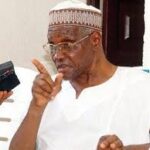The late President Umaru Musa Yar’adua was governor twice, from 1999 to 2007, in that state. Education was his first priority. On leaving office, Ibrahim Shema was elected in 2007. Now he is in his second and last tenure. Even when Governor Shema did not ‘inherit’ the office of governor as deputy governor from Yar’adua, all the projects the late Yar’adua embarked upon but did not finish Governor Shema completed them before he embarked on new projects.
The task before me in Katsina was to look at some of the eight projects of Millennium Development Goals of the United Nations, which include the following:
Eradicating extreme poverty and hunger
Promoting gender equality and empowerment of women,
Achieving universal primary education target
Reducing child mortality
Improving maternal health
Combating HIV, malaria and other diseases
Ensuring environmental sustainability and
Developing a global partnership for development.
Let me start with the first priority of the late Yar’adua as governor, which was education. The late president gave it massive funding and when he left Katsina State to become President, Governor Shema maintained education as first priority. New school buildings were erected, old ones rehabilitated, more teachers employed, new take-home pays implemented for teachers. hence school in-takes increased. Malam Mustapha Aliyu Kofar Sauri, the Headmaster of Hassan Usman Model Science Primary School, told me that he was glad that the number of girls enroled had risen tremendously. Clearly, nowhere did I witness pupils being taught under trees. The Katsina State University, named Umaru Musa Yar’adua University, was built to standard. The same went for the Islamic University and other ducation-related projects.
In the area of housing, 30 blocks of flats were constructed in each local government area, while 700 block of flats were constructed in Katsina. Some major streets in Daura, Katsina, Dutsen-Ma, Malumfashi, Funtua towns were powered by solar energy.
In health care delivery, many health centres were built, and what I saw at Angwar Ruga General Hospital was very instructive. I was with a colleague from the Voice of Nigeria – Zabairu Abdura’uf Idris. We wanted to see what projects were in place for maternal health. The Chief Medical Director of the Hospital, Dr Mudassir Abdulmajid, was on ground and took us round the hospital. We saw a well-equipped hospital. There was one Dr Kiesse Weldjiek from The Netherland who has been in Katsina for 27 years. His mission was to carry out surgical operations on victims of Visco Virginal Fistula (VVF) and in spite of harrassments from thieves, he never gave up on his patients. A look at the patients showed there were young ladies and women from the state and neighbouring Niger Republic who needed specialist attention. Dr Weldjiek was there for them. He was treating them while the Katsina State government, the MDGs and the Turai Yar’adua Centre bore their bills.
“Before now, many husbands abandoned their wives because they had VVF. Now, it is curable. Ben, if you bring any VVF patient, I will cure her for you,” Dr Weldjiek told me.
In recognition of Dr Kiesse Weldjiek’s work, the Katsina state government also built a VVF victims rehabilitation centre where, on discharge from hospital, the women were trained self-reliance.It is called Kiesse Rehabilitation Centre. Hajia Zubaida Usman Malumfashi, the Principal of the Centre said before women leave the centre, they are taught sewing, knitting, gardening, and other activities that promote self-reliance. At the centre, their empowerment starts from training, basic literacy arithmetic, hygiene and small venture management. Before they graduate, Hajia Malumfashi said, some of the men who had earlier abandoned their wives would come back to rejoin them. They would be healthier, happier and more attractive.
The Permanent Secretary in charge of MDGs in the State, Malam Isiaku Dikko, said the state government contributed its mandatory 50% counterpart funding and, therefore, had access to the MDGs funds. Malam Dikko said the projects were functional because the governor did not interfere or determine what projects to embark upon and who the contractors would be.
To tackle poverty and employ the youths, a crafts centre has been created. And on water supply, efforts are being made to meet the needs of the teeming population. The permanent secretary of the Ministry of Agriculture, Alhaji Maikaita Ango Dutsen-ma, said, after education, the next priority is agriculture. According to him, Governor Shema had established a think-tank on agriculture to design an action plan for the government. Members of the committee were drawn from universities and agricultural research institutes. The essence is to ensure adequate food security for the people.
When I went for the Presidential election in April, 2011 the opposition in Katsina was stiff. I asked one Bashir Tukur (Saki) why the opposition was so vehemently against the governor. He simply said he did not know any reason why the governor would not win the election. ‘I don’t know why they don’t like a winning horse,’ he said. He counted the projects executed by the governor.
I recalled my experience while entering Katsina through Maradi from Niger Republic. The over-loaded Peugeot 504 station wagon had four passengers from Niger Republic. The rest were Nigerians, all from that state, except me. The indigenes argued that Governor Shema must not be re-elected. The passengers from Niger Republic were disappointed as they compared Maradi and Katsina, in terms of infrastructure. They felt the governor was doing well and deserved re-election.
After the presidential election 2011, I took off from Fadama View Hotel on a motorcycle to catch a car to Kaduna on my way back to Abuja. Because of the dangerous way the motorcyclist zoomed off, I cautioned him and demanded that he reduced his speed. The man slowed down, shook his head, and said: “oh, I can see you belong to PDP.” I told him I was a journalist. That made him to stop by the roadside. He turned and looked at me. “I have a message to the governor through you. Tell him that if he likes let him tar the road from my village to the Government House. That is his headache. We are hungry. There is no money in circulation. How can hungry people ride on good roads? Please, tell him we are hungry and angry with him.”
But, come to think of it. I felt the man made a point. With these projects on ground, the next thing is the development of the human soul. Pay attention to food security. The permanent secretary, Ministry of Agriculture says there are over 340 dams and identified water reservoirs for agricultural purposes. The youths can, therefore, engage in all-year-round farming of crops, fishing, gardening, poultry, bee-keeping, sugarcane and and cotton farming.
I think it is imperative for the governor to spread his programmes so that both rural and urban dwellers can benefit from them. As for his cabinet, he should appoint those who are really out to serve the people. This is my candid advice to you, Governor Ibrahim Shema.
Shemang, a journalist with Voice of Nigeria, can be contacted on [email protected]
 Join Daily Trust WhatsApp Community For Quick Access To News and Happenings Around You.
Join Daily Trust WhatsApp Community For Quick Access To News and Happenings Around You.


